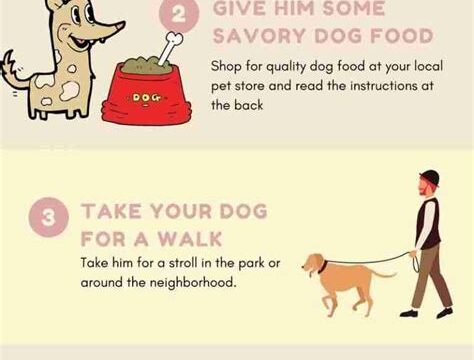Being a pet owner is a rewarding and fulfilling experience, but caring for a special needs dog requires extra attention and dedication. Whether your dog has physical limitations, sensory impairments, or behavioral challenges, providing exceptional care is essential for their well-being and quality of life. In this blog post, we will explore various tips and strategies for giving your special needs dog the love and support they deserve. From understanding their unique needs to creating a safe and accessible environment, establishing a consistent routine, and addressing their medical and emotional needs, we will cover all aspects of caring for a special needs dog. Whether you’re new to this journey or seeking additional guidance, these insights will equip you with the knowledge and tools to ensure your furry companion lives a happy and fulfilling life. Let’s dive into the world of caring for a special needs dog and learn how to provide them with exceptional care.
Understanding your special needs dog
When it comes to understanding your special needs dog, it’s important to recognize that each dog is unique and may have different needs than a typical, healthy dog. This requires a deeper level of empathy and attentiveness to their individual needs and challenges.
One of the key components of understanding your special needs dog is to observe and learn about their specific condition or disability. Whether it’s a physical disability, a behavioral issue, or a medical condition, taking the time to educate yourself about their unique needs is essential in providing the best care and support.
Additionally, communication with your special needs dog is crucial. This may involve learning to interpret their body language, vocalizations, or any other ways they express their needs and emotions. Listening to and understanding your dog’s communication cues can help in identifying their specific needs and providing the appropriate support.
Finally, patience and compassion are paramount in understanding your special needs dog. It’s important to remember that they may require extra time, care, and accommodations, and approaching their needs with empathy and understanding can make a world of difference in their quality of life.
Creating a safe and accessible environment
When creating a safe and accessible environment for your special needs dog, it’s important to consider their specific challenges and limitations. Start by removing any potential hazards or obstacles from your home, such as small objects that could be choking hazards or furniture that they could easily bump into. Make sure that pathways are clear and easily navigable for your dog, and consider using ramps or steps to help them access higher or lower areas without straining themselves.
Additionally, it’s important to provide your special needs dog with a comfortable and secure space where they can rest and relax without feeling overwhelmed. This could be a designated area with a cozy bed and familiar toys, away from noisy or high-traffic areas of your home. Creating a safe and comforting environment for your dog to retreat to when they need some peace and quiet is crucial for their overall well-being.
Consider making adjustments to your outdoor spaces as well, ensuring that your yard or garden is safely enclosed and free from any potential dangers. This may involve installing a secure fence or gate to prevent your dog from wandering off, as well as removing any toxic plants or sharp objects that could pose a threat to their safety.
Finally, always keep in mind that each special needs dog is unique, and what works for one may not necessarily work for another. Take the time to observe your dog’s behavior and mobility, and make adjustments to their environment as needed to ensure that they can move around and live comfortably in their surroundings.
Establishing a routine and consistent schedule
Establishing a routine and consistent schedule is crucial for your special needs dog’s well-being. Dogs, especially those with special needs, thrive on routine and predictability. By establishing a consistent schedule, you can help reduce stress and anxiety for your furry friend, and create a stable environment for them to thrive in.
One way to establish a routine is by feeding your dog at the same times every day. This helps regulate their digestion and can also aid in the management of certain health conditions. Additionally, scheduling regular bathroom breaks is important, as some special needs dogs may require more frequent outings. Consistency in walking and exercise times is also beneficial for both the physical and mental well-being of your pet.
Another important aspect of establishing a routine is ensuring your dog has a consistent bedtime and wake-up time. This can help regulate their sleep patterns and provide them with a sense of security. By establishing a consistent schedule for your special needs dog, you can help them feel safe, secure, and happy in their day-to-day life.
Overall, establishing a routine and consistent schedule is an essential part of caring for a special needs dog. By providing structure and predictability in their daily life, you can help promote their overall well-being and happiness.
Specialized training techniques for special needs dogs
Training a dog with special needs requires patience, consistency, and specialized techniques to help them overcome their challenges. One important technique is using positive reinforcement to reward good behavior. This can be especially effective for special needs dogs, as it helps build their confidence and motivates them to learn new behaviors.
Another key training technique for special needs dogs is target training, which involves teaching the dog to touch or follow a specific object. This can be useful for guiding visually impaired dogs or helping dogs with mobility issues navigate their environment. By using target training, owners can help their special needs dogs become more independent and confident in their surroundings.
Clicker training is also a valuable technique for special needs dogs, as it provides clear communication and instant feedback. The use of a clicker to mark desired behaviors, followed by a reward, can help special needs dogs understand what is expected of them and accelerate their learning process.
Lastly, desensitization and counter-conditioning are crucial techniques for special needs dogs who may have sensory sensitivities or anxieties. By gradually exposing the dog to the source of their fear or discomfort in a controlled and positive way, and associating it with something positive, owners can help their special needs dogs overcome their challenges and build confidence.
Nutritional considerations and dietary adjustments
When it comes to nutritional considerations and dietary adjustments for special needs dogs, it’s important to consult with a veterinarian or animal nutritionist to determine the best course of action. Whether your dog has food allergies, digestive issues, or specific dietary requirements, a professional can help you create a customized meal plan that meets their needs.
Special needs dogs may require specialized diets that are tailored to their individual health concerns. For example, a dog with kidney disease may need a low-protein diet, while a dog with diabetes may require a diet that’s low in carbohydrates. By working closely with a professional, you can ensure that your dog’s nutritional needs are being met.
In addition to making dietary adjustments, it’s important to carefully consider the quality of ingredients in your dog’s food. Look for high-quality, easily digestible protein sources, as well as whole grains and vegetables. Avoid artificial additives, fillers, and by-products, as these can exacerbate digestive issues and allergies in special needs dogs.
Remember that regular monitoring and adjustments may be necessary as your dog’s health condition changes. Keep an open line of communication with your veterinarian to ensure that your dog’s diet is always optimized for their specific needs.
Managing medical needs and regular check-ups
When it comes to caring for a special needs dog, managing their medical needs and ensuring they receive regular check-ups is crucial for their overall well-being and quality of life. Special needs dogs may have a variety of health issues that require ongoing attention and treatment, so it’s important for pet owners to work closely with their veterinarian to develop a comprehensive medical care plan.
Regular check-ups are essential for special needs dogs to monitor their health and address any emerging issues before they escalate. These check-ups allow veterinarians to assess the dog’s condition, adjust treatment plans as needed, and provide guidance on managing their specific medical needs.
In addition to regular veterinary visits, pet owners should also be vigilant about monitoring their special needs dog for any changes in behavior, appetite, or mobility that could indicate a health issue. Early detection and intervention can make a significant difference in the outcome for special needs dogs, so it’s important to be proactive and observant.
Overall, managing the medical needs of a special needs dog involves proactive care, regular check-ups, and open communication with the veterinarian to ensure that the dog’s health is closely monitored and any issues are promptly addressed.
Adapting exercise and physical activity
Adapting exercise and physical activity
Adapting exercise and physical activity for your special needs dog is crucial for their overall health and well-being. Special needs dogs may have mobility issues or limitations that require modified or alternative forms of exercise. It’s important to consult with a veterinarian or animal physical therapist to develop an exercise plan tailored to your dog’s specific needs.
One way to adapt exercise for a special needs dog is to focus on low-impact activities such as swimming or gentle walks. These activities can help improve muscle strength and cardiovascular health without putting too much strain on your dog’s joints. Modifying exercise equipment and toys to accommodate your dog’s specific needs can also make physical activity more accessible and enjoyable for them.
Additionally, incorporating physical therapy exercises into your dog’s daily routine can help improve their mobility and flexibility. Activities such as balance exercises, range of motion exercises, and stretching can be beneficial for special needs dogs. It’s important to start slow and gradually increase the intensity and duration of exercise as your dog builds their strength and endurance.
Ultimately, adapting exercise and physical activity for your special needs dog requires patience, creativity, and a willingness to explore different options. By prioritizing your dog’s unique abilities and limitations, you can create a safe and enjoyable exercise routine that supports their overall health and quality of life.
Emotional support and socialization strategies
Emotional support and socialization are crucial for special needs dogs to lead happy and fulfilling lives. Dogs with special needs often face challenges in social situations and may require additional emotional support to navigate the world around them.
It’s important to create a safe and nurturing environment for your special needs dog, where they feel secure and can build trust. This can be achieved through positive reinforcement, comforting routines, and providing a consistent sense of security. Your emotional support is paramount in helping your dog feel at ease in their surroundings.
Socialization is also an important aspect of a special needs dog’s well-being. It’s essential to gradually expose them to different environments, people, and other animals, in a controlled and positive manner. This can help them build confidence and reduce anxiety in unfamiliar situations. With patience and understanding, you can help your special needs dog develop the social skills necessary to thrive in various settings.
Overall, emotional support and socialization strategies play a key role in enhancing the quality of life for special needs dogs. By providing a supportive environment and gradually exposing them to new experiences, you can help your furry friend feel more confident and comfortable in the world around them.





